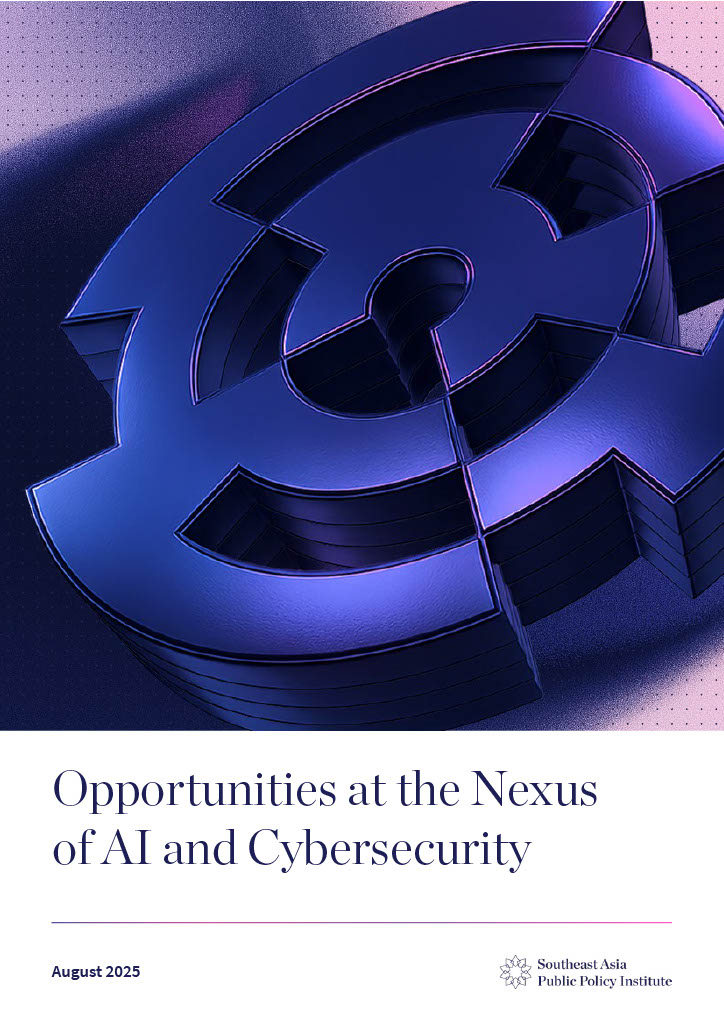Opportunities at the Nexus of AI and Cybersecurity

This Policy White Paper, developed by the Southeast Asia Public Policy Institute in collaboration with Microsoft, examines how artificial intelligence (AI) is reshaping the global cybersecurity landscape and how cloud adoption can enhance the response by Southeast Asian governments to increasingly sophisticated cyberattacks.
The paper reviews efforts in six Southeast Asian countries to advance cloud and AI adoption, identifies key challenges, and sets out high-level recommendations for policymakers. By addressing these challenges and fostering greater collaboration, the region can strengthen its resilience and secure its rapidly growing digital economy.
Download the full report here.
Executive Summary
Southeast Asia has emerged as the world’s fastest-growing digital economy, but rapid digitalisation has also brought escalating risks. Cybercrime in the region has intensified, with successful cyberattacks doubling between 2023 and 2024. Businesses across Southeast Asia now face significant exposure, with each incident costing an average of US$3 million. More concerning is the evolving nature of these threats. Nation-state actors are increasingly active, deploying advanced tactics and, in some cases, collaborating with criminal groups. A growing share of attacks targeting critical infrastructure and political institutions have been linked to state-backed operations, with operators in China, North Korea, Russia, and Iran identified as key actors.
In addition, artificial intelligence (AI) is transforming the cyber threat landscape, enabling malicious actors to scale their operations with unprecedented speed and sophistication. Countering these AI-driven threats requires deploying AI as a defensive tool. Today, advanced cybersecurity solutions increasingly integrate AI to improve detection and response. Yet the full potential of AI can only be realised when operating on a unified data estate, which allows systems to process vast amounts of information effectively. In this regard, cloud infrastructure plays a central role, serving as the backbone for modern cybersecurity. By consolidating data, the cloud enables automated incident response, near-real-time defensive actions, and seamless security orchestration across entire networks.
Across Southeast Asia, governments and businesses are recognising the importance of AI and cloud adoption. Many have introduced digital transformation strategies, including “Cloud First” policies to accelerate uptake of advanced technologies. New regulatory bodies have been established, while laws and frameworks are being updated to reflect the evolving digital landscape. Singapore and Malaysia have advanced furthest in building ecosystems that support AI and cloud adoption, but capacity constraints remain across much of the region. Addressing these challenges requires sustained efforts and collaboration between public and private stakeholders.
Key challenges hindering the adoption of cloud-based, AI-enhanced cybersecurity include:
- Fragmented digital policy frameworks, with overlapping laws and regulatory bodies creating inconsistency and limited coordination.
- Insufficient incentives to adopt cloud technologies that underpin AI-driven defences.
- Legacy systems that are not well aligned with the requirements of modern cybersecurity solutions.
- Underinvestment in both technology and human capital, leaving fragile foundations.
- Limited coordination at both national and international levels to build capacity.
To overcome these obstacles, policymakers should prioritise:
- Strengthening Cloud First policies and reforming legacy regulations to enable scalable AI cybersecurity.
- Modernising cyber threat assessment and security standards, drawing on global standards and risk-based approaches.
- Balancing security and openness by allowing cross-border flows of non-sensitive data.
- Incentivising investment in advanced technologies across both public and private sectors.
- Closing the cybersecurity and AI talent gap by developing a stronger workforce ecosystem.
Finally, effective responses to cybersecurity challenges must extend beyond national boundaries. Cyberattacks are inherently transnational, demanding cooperation across Southeast Asia and with international partners. Enhanced collaboration will allow countries to share intelligence, resources, and best practices, ensuring that the region develops together and no country is left behind.
This paper has been researched and produced by the Southeast Asia Public Policy Institute with support from Microsoft. The information and analysis presented are based on interviews with relevant stakeholders, publicly available information, and analysis by the authors. It does not represent the views of Microsoft. It is not intended to be an exhaustive review of policy, legislation, or regulation and should be used with due caution and consideration of its scope and limitations.
About the Southeast Asia Public Policy Institute
The Southeast Asia Public Policy Institute is a research institute based in Bangkok and Singapore, working across the region. Our mission is to support the development of solutions to the most pressing public policy challenges facing Southeast Asia in the 21st century. The Institute undertakes in-depth research to develop actionable policy solutions on a range of issues across sustainability, technology, public health, trade, and governance. We convene dialogues with stakeholders and decisionmakers to drive discussion on the challenges and opportunities facing markets across the region. The Institute draws on a network of in-market researchers, advisors, and partners to provide insights and recommendations for governments, policymakers, and businesses.



